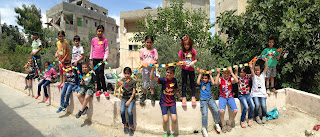So our three months in Abu Dis are almost up. Here are some photos of the highlights of our time here:
This blog is written by CADFA volunteers based in Abu Dis. For more about CADFA see CADFA.org or our Facebook page @camdenabudis The posts are by the volunteers and do not necessarily represent the views of CADFA
Friday 10 July 2015
Saying Goodbye, For Now
It feels surreal to think that this time next week I will be back in London. There is a lot I know I will not be able to fully realise until I have got back home and had some time but I know that I will miss being here...
My experience has been eventful. I have enjoyed so much here and there have been things I imagined might be better.
Overall I take home with me my fiery recommitment to stand in solidarity with Palestinians.
My experience has been eventful. I have enjoyed so much here and there have been things I imagined might be better.
Overall I take home with me my fiery recommitment to stand in solidarity with Palestinians.
Saturday 4 July 2015
Seeing the occupation
Seeing the occupation
 |
| Demolished house in Abu Dis |
In many ways, as a foreigner, the occupation is something
you can clearly feel but not always see directly. Most of the suffering that
the Palestinians face every day will never touch us. Being a foreigner,
particularly a European one, gives you obvious privilege. We aren't made to get
off the bus at the check point and line up behind a fence waiting to show the
soldiers our ID before being allowed back on (or not). We can move between Abu
Dis and Jerusalem as freely as we like, while the actual citizens of this country
have to request permission (which is most often rejected) as if they were
prisoners asking for day release. These are all distressing aspects of everyday
life that we can be aware of but only really see through their descriptions. On
the occasions that we do come face to face with evidence of the occupation, it’s
as troubling as anyone would imagine. For example, we once drove up a side road
in Abu Dis to one of the most beautiful houses I had ever seen. It almost
resembled something from a fairy tale until we got to the other side and saw
that it had been completely destroyed. I found out that the house had been
built by a professor at Al Quds University and had recently been demolished by
the IDF. Its only crime was that they felt it was built too close to the
separation wall. A wall whose own existence has been recognised as illegal
under international law.
It’s interesting to
notice also how differently the soldiers tend to behave once they become aware
of a foreign presence. On one occasion at the Al Zaytoun checkpoint which is
used to cross into Jerusalem, These checkpoints have been made to look as cage like as possible.
I arrived to find the place almost empty. The only
people there were two Palestinian women with a child and they appeared to have
been waiting at the gate for a long time. They repeatedly called out but the
soldiers seemed to simply ignore them. It was only when I got bored of waiting
and went to find a soldier myself and produced my British passport that the
situation changed. This soldier had been
present in the checkpoint for as long as the Palestinian women had been standing
at the gate but once I spoke to him he called through to the soldiers
responsible for the gates and they were immediately opened. I clearly heard the
words “British passport” being used. I motioned to the women to come through
with me to make sure that they used this opportunity and weren't left behind. |
| Al Zaytoun checkpoint |
On
another occasion, I went through the Jerusalem checkpoint on the bus and
witnessed a very elderly man who had trouble walking being forced off of the
bus by a soldier, who seemed to feel it was necessary to go through the exact
same procedure outside in the midday sun as she would have done inside the bus.
Her approach to him was very aggressive and hostile and she appeared to have no
regard for his age or physical condition. After a few minutes of shouting at
the old man it seemed likely that she wouldn't
grant him access to Jerusalem, however at that moment she glanced in my
direction and saw that I had been watching the whole exchange. Without a word,
she handed the man his ID card and waved him back onto the bus. Situations like
these are a strong reminder of how dehumanised the Palestinians have become in
the eyes of the soldiers.
Subscribe to:
Posts (Atom)








